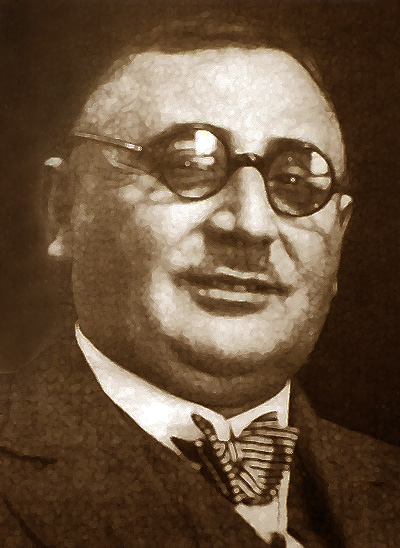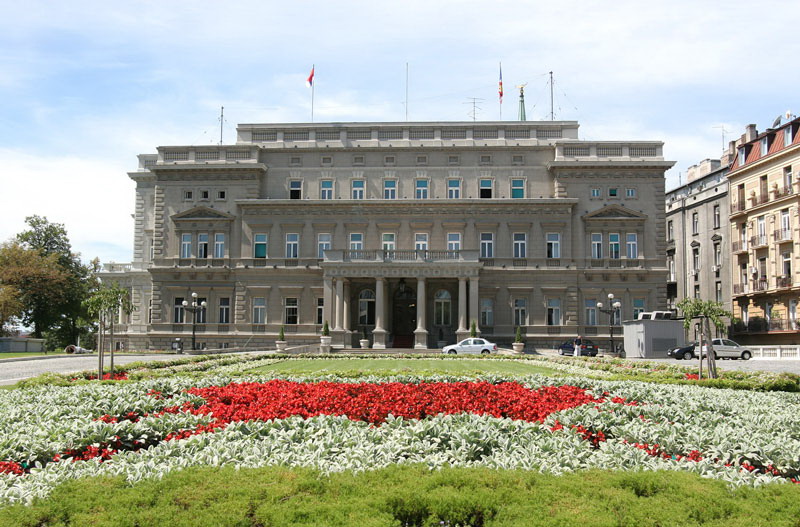|
Stojan Protić
Stojan Protić ( sr-cyrl, Стојан Протић; 28 January 1857 – 28 October 1923) was a Serbian politician and writer. He served as the prime minister of the Kingdom of Serbs, Croats, and Slovenes between 1918 and 1919, and again in 1920, later called Yugoslavia. He is best remembered as the key theoretician of Serbian parliamentarism. Biography Stojan M. Protić was born in Kruševac. His great-great-grandfather ('' čukundeda''), Toma Dečanac, moved from the village of Dečani with his wife and two sons, to Kruševac. Having studied history and philosophy in Belgrade's Grandes écoles (''Velika škola''), Protić briefly worked in government service before dedicating himself to journalism and becoming editor of ''Samouprava'' ("Autonomy"), the official daily newspaper of the People's Radical Party. In 1884 he became editor of another paper, ''Odjek'' ("Echo"), and advocated changing Serbia's constitution. He ran in the 1887 elections and was elected to Parliament. As s ... [...More Info...] [...Related Items...] OR: [Wikipedia] [Google] [Baidu] |
Prime Minister Of Yugoslavia
The prime minister of Yugoslavia ( sh-Cyrl-Latn, Премијер Југославије, Premijer Jugoslavije) was the head of government of the Yugoslavia, Yugoslav state, from the Creation of Yugoslavia, creation of the Kingdom of Serbs, Croats and Slovenes in 1918 until the Breakup of Yugoslavia, breakup of the Socialist Federal Republic of Yugoslavia in 1992. History Kingdom of Yugoslavia The Kingdom of Serbs, Croats and Slovenes was created by the unification of the Kingdom of Serbia (Kingdom of Montenegro, Montenegro had united with Serbia five days previously, while the regions of Autonomous Province of Kosovo and Metohija, Kosovo and Metohija, Baranya (region), Baranya, Syrmia, Banat, Bačka and Vardar Macedonia were parts of Serbia prior to the unification) and the provisional State of Slovenes, Croats and Serbs (itself formed from territories of the former Austria-Hungary) on 1 December 1918. Until 6 January 1929, the Kingdom of Serbs, Croats and Slovenes was a par ... [...More Info...] [...Related Items...] OR: [Wikipedia] [Google] [Baidu] |
Jovan Avakumović
Jovan Avakumović (1 January 1841 – 3 August 1928) was a Serbian lawyer, criminologist, statesman, and Prime Minister of Serbia. Biography Born in Belgrade, a descendant of a respected Serbian merchant family of Baba-Dudići, Avakumović was a nephew of General and Royal Regent Jovan Belimarković. He graduated from the University of Belgrade Faculty of Law, and studied law and state science (1862–1868) in Germany, French, and Switzerland. He was a member of the Liberal Party. In 1873 he was appointed the First Secretary of Cassation, and in 1875 mayor of Belgrade, then head of the police department of the Ministry of the Interior in the Liberal government of Stevča Mihailović until 1880. That year he briefly became a justice minister in the cabinet of Jovan Ristić, but already in October the same year, the government fell and he was replaced by the Progressive Milan Piroćanac. In 1881–1887 he was a judge in the Court of cassation. In 1887 he was briefly Minister of Jus ... [...More Info...] [...Related Items...] OR: [Wikipedia] [Google] [Baidu] |
Ivan Pavićević
Ivan () is a Slavic male given name, connected with the variant of the Greek name (English: John) from Hebrew meaning 'God is gracious'. It is associated worldwide with Slavic countries. The earliest person known to bear the name was Bulgarian tsar Ivan Vladislav. It is very popular in Russia, Ukraine, Croatia, Serbia, Bosnia and Herzegovina, Slovenia, Bulgaria, Belarus, North Macedonia, and Montenegro and has also become more popular in Romance-speaking countries since the 20th century. Etymology Ivan is the common Slavic Latin spelling, while Cyrillic spelling is two-fold: in Bulgarian, Russian, Macedonian, Serbian and Montenegrin it is Иван, while in Belarusian and Ukrainian it is Іван. The Old Church Slavonic (or Old Cyrillic) spelling is . It is the Slavic relative of the Latin name , corresponding to English ''John''. This Slavic version of the name originates from New Testament Greek (''Iōánnēs'') rather than from the Latin . The Greek name is in turn ... [...More Info...] [...Related Items...] OR: [Wikipedia] [Google] [Baidu] |
Ljubomir Stojanović
Ljubomir Stojanović ( sr-cyr, Љубомир Стојановић, sometimes mentioned as ''Ljuba Stojanovic'') (6 August 1860, Užice – 16 June 1930) was a Serbian politician, philologist and academic. Biography Stojanović was a philologist and historian, who graduated from the School of Philosophy at the Grandes écoles ( sr, Велика школа, the ''Grandes Écoles''). After studies in Belgrade he went on to post-graduate studies in Vienna, St. Petersburg and Leipzig. At first a grammar school professor, he was appointed university professor at his ''alma mater'', the Grandes éecoles (1891-1899). Opposed to the royal absolutism of King Aleksandar I Obrenović, Stojanović joined the People's Radical Party of Nikola Pašić in 1897. After the split with the older generation of Radicals who accepted the compromise with the Crown in 1901, Stojanović led the younger group of Radicals, a semi-independent faction since 1901 which eventually became independent in 1905. ... [...More Info...] [...Related Items...] OR: [Wikipedia] [Google] [Baidu] |
Velimir Todorović
Velimir ( sr-cyr, Велимир) is a Serbo-Croatian masculine given name and sometimes a surname, a Slavic name derived from elements ''vele'' "great" and ''mir'' "peace, prestige". It may refer to: *Velimir Ilić (born 1951), politician *Velimir Ivanović, (born 1978), Serbian footballer *Velimir Jovanović, (born 1987), Serbian footballer *Velimir Khlebnikov (1885–1922), Russian poet and playwright * Velimir Milošević (1937–2004), Montenegrin writer, poet, and editor *Velimir Naumović (1936–2011), Serbian footballer *Velimir Perasović (born 1965), Croatian basketball player *Velimir Radinović, (born 1981), Canadian-Serbian basketball player *Velimir Radman, (born 1983), Croatian footballer *Velimir Sombolac, (1939–2016), Serbian-Yugoslav footballer *Velimir Stjepanović, (born 1993), Serbian swimmer *Velimir Škorpik (1919–1943), Croatian-Yugoslav Partisan commander *Velimir Valenta (1929–2004), Croatian-Yugoslav rower * Velimir Varga (born 1980), Slovenian-Cro ... [...More Info...] [...Related Items...] OR: [Wikipedia] [Google] [Baidu] |
Ministry Of Internal Affairs (Serbia)
The Ministry of Internal Affairs of the Republic of Serbia ( sr, Mинистарство унутрашњих послова, Ministarstvo unutrašnjih poslova; abbr. MUP) or the Ministry of Interior, is a cabinet-level ministry in the Government of Serbia. The Ministry is responsible for local and national Police services with municipal and district branches throughout the country. Its core responsibilities include: crime prevention, criminal apprehension, investigations, customs and border control, counter-terrorism, anti-corruption, anti-narcotics and disaster relief. The ministry is also responsible for issuing passports and personal identification to citizens. The current minister is Bratislav Gašić, in office since 26 October 2022. As of August 2016, the Ministry of Internal Affairs has a total of 42,817 employees, of whom 28,266 are uniformed officers. Of those, 70.2% have secondary education, while 27.8% have higher or high education. Organization * Minister of Interi ... [...More Info...] [...Related Items...] OR: [Wikipedia] [Google] [Baidu] |
Geca Kon
Geca Kon also spelled Gaetz Kohn (; 2 August 1873 – 1941) was a Serbian publisher. Early life Kon was born in Csongrád. His father was a rich rabbi and was the director of an elementary school. Unable to complete school, Kon moved to Belgrade in 1889. In Belgrade, he found work in the bookshop owned by Frederick Breslauer. He worked in the shop until 1894, then moved to Novi Sad, staying there for a year. Publishing career In 1901 he established a bookselling and publishing business which soon became the largest in Yugoslavia. From his premises in Belgrade he published over 3,500 books before his business was closed in 1941 with the Axis Invasion of Yugoslavia. In 1906 he began publishing the journal ''Archives of Law and Social Sciences''. The first catalogue of books of his publications Gece Kona came out in 1910. The catalogue contained 50 books, a selection that included many famous Serbian writers, including Mihailo Gavrilović, Slobodan JovanovićToma Živanović Sto ... [...More Info...] [...Related Items...] OR: [Wikipedia] [Google] [Baidu] |
Mayor Of Belgrade
The Mayor of Belgrade ( sr, Градоначелник Београда / ''Gradonačelnik Beograda'') is the head of the City of Belgrade (the capital and largest city of Serbia). The Mayor acts on behalf of the city, and performs an executive function in the City of Belgrade. The position is important as the city is the most important hub of economy, culture, science and technology in Serbia. The current Mayor of Belgrade is Aleksandar Šapić ( SNS). He was elected by the City Assembly on 20 June 2022, following the 2022 City Assembly election. Office According to the current legislation, the Mayor is elected along with members of the City Assembly at the direct secret ballot for the period of four years. The Mayor may not be a councilor of the City Assembly. The Mayor has a Deputy who replaces him/her in case of an extended absence and/or due to any other reasons that prevent the Mayor to perform the duties. The Mayor appoints and dismisses the Deputy Mayor based on th ... [...More Info...] [...Related Items...] OR: [Wikipedia] [Google] [Baidu] |
Milan St
Milan ( , , Lombard: ; it, Milano ) is a city in northern Italy, capital of Lombardy, and the second-most populous city proper in Italy after Rome. The city proper has a population of about 1.4 million, while its metropolitan city has 3.26 million inhabitants. Its continuously built-up urban area (whose outer suburbs extend well beyond the boundaries of the administrative metropolitan city and even stretch into the nearby country of Switzerland) is the fourth largest in the EU with 5.27 million inhabitants. According to national sources, the population within the wider Milan metropolitan area (also known as Greater Milan), is estimated between 8.2 million and 12.5 million making it by far the largest metropolitan area in Italy and one of the largest in the EU.* * * * Milan is considered a leading alpha global city, with strengths in the fields of art, chemicals, commerce, design, education, entertainment, fashion, finance, healthcare, media ( ... [...More Info...] [...Related Items...] OR: [Wikipedia] [Google] [Baidu] |
Vidovdan Constitution
The Vidovdan Constitution was the first constitution of the Kingdom of Serbs, Croats and Slovenes. It was approved by the Constitutional Assembly on 28 June 1921 despite the opposition boycotting the vote. The Constitution is named after the feast of St. Vitus (''Vidovdan''), a Serbian Orthodox holiday. The Constitution required a simple majority to pass. Out of 419 representatives, 223 voted for, 35 voted against and 161 abstained. The Constitution was in effect until King Alexander proclaimed his 6 January Dictatorship on that date in 1929. Adoption The process of adopting the Vidovdan Constitution will reveal major political conflicts in the new state. Although there were earlier plans to adopt a Constitution (see the Guidelines, the Corfu Declaration, the Geneva Agreement), the Constitution was eventually adopted by a narrow majority and overriding on a national basis. For *Democratic Party *People's Radical Party *Yugoslav Muslim Organization * Alliance of Agrarians *D ... [...More Info...] [...Related Items...] OR: [Wikipedia] [Google] [Baidu] |
Geneva Declaration (1918)
The Geneva Declaration, Geneva Agreement, or Geneva Pact was a statement of political agreement on the provisional political system in the future union of the South Slavs living in the territory of the former Austria-Hungary and Serbia. It was agreed by Serbian Prime Minister Nikola Pašić on behalf of the Serbia, representatives of Serbian parliamentary opposition, representatives of the National Council of the State of Slovenes, Croats and Serbs which recently seceded from Austria-Hungary, and representatives of the Yugoslav Committee. The talks held in Geneva, Switzerland on 6–9 November 1918 built upon and were intended to supersede the 1917 Corfu Declaration agreed by Pašić and Yugoslav Committee president Ante Trumbić. The basis for the talks was provided by the Greek Prime Minister Eleftherios Venizelos on behalf of the Supreme War Council of the Triple Entente. The talks were necessary in the process of creation of Yugoslavia as a means to demonstrate to the Enten ... [...More Info...] [...Related Items...] OR: [Wikipedia] [Google] [Baidu] |



